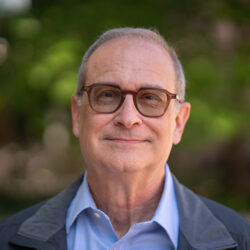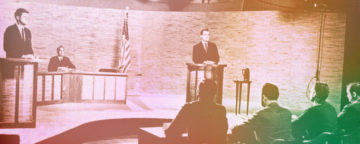Dan Romer wrote in The Hill that guns, like cars, are a major cause of deaths and injuries in the United States, especially for young people. Yet we know so much about motor-vehicle deaths than guns deaths - because we study them.


Michael Rozansky has worked as an editor, writer and reporter for 30 years. Before joining the Annenberg Public Policy Center as director of communications, he spent more than 20 years at the Philadelphia Inquirer, most recently supervising its arts and entertainment coverage. He has reported on the arts, media, business, politics, national and regulatory issues. Rozansky also developed and taught a class at Temple University on the history and practice of celebrity journalism. He received a bachelor’s degree in English and American literature from Brown University and a master’s degree in journalism from Columbia University’s Graduate School of Journalism.

Dan Romer wrote in The Hill that guns, like cars, are a major cause of deaths and injuries in the United States, especially for young people. Yet we know so much about motor-vehicle deaths than guns deaths - because we study them.

A new bipartisan Annenberg Public Policy Center report that proposes a serious overhaul of the 2016 general-election presidential debates to improve their quality, reach and relevance in the age of social media and an increasingly diverse electorate has drawn widespread media coverage.

Communication scholar Dietram A. Scheufele from the University of Wisconsin-Madison has joined the Annenberg Public Policy Center as a Visiting Scholar this fall. Seven postdoctoral fellows also have joined APPC, most researching the science of science communication.

An article in Science magazine says that new efforts are required to preserve the integrity of science in the face of what appear to be an increasing incidence of irreproducible findings and retractions.

With a flurry of candidates entering the 2016 presidential race, FactCheck.org and its science feature, SciCheck, are examining the campaigners' recent statements and revisiting past claims. Recent posts examine claims by Scott Walker, Donald Trump, and Vermont Sen. Bernie Sanders.

Adolescents who have difficulty with impulse control may be more prone to risky sexual behavior, with consequences such as sexually transmitted diseases and unintended pregnancies. A study finds that individual differences in working memory can predict early sexual activity during adolescence.

The Annenberg Working Group on Presidential Campaign Debate Reform – a bipartisan group of top officials from past presidential campaigns – released its recommendations to help democratize the presidential general election debate process ahead of the 2016 presidential election.

A new study of public service advertisements (PSAs) to address obesity finds that appealing to fear – and the health consequences of too much sugar, such as diabetes and heart disease – had the greatest effect on teens’ intention to cut back on sugary beverages like soda and energy drinks.

Marketers have said for years that Americans give up their data online, on apps and in stores because of the benefits they receive, such as discounts or special offers. But a new national survey rebuts this claim and offers a new explanation: resignation.

Amy B. Jordan, Ph.D., associate director of the Annenberg Public Policy Center, took office this week as president of the International Communication Association , the leading international organization dedicated to scholarship in the field of communication.